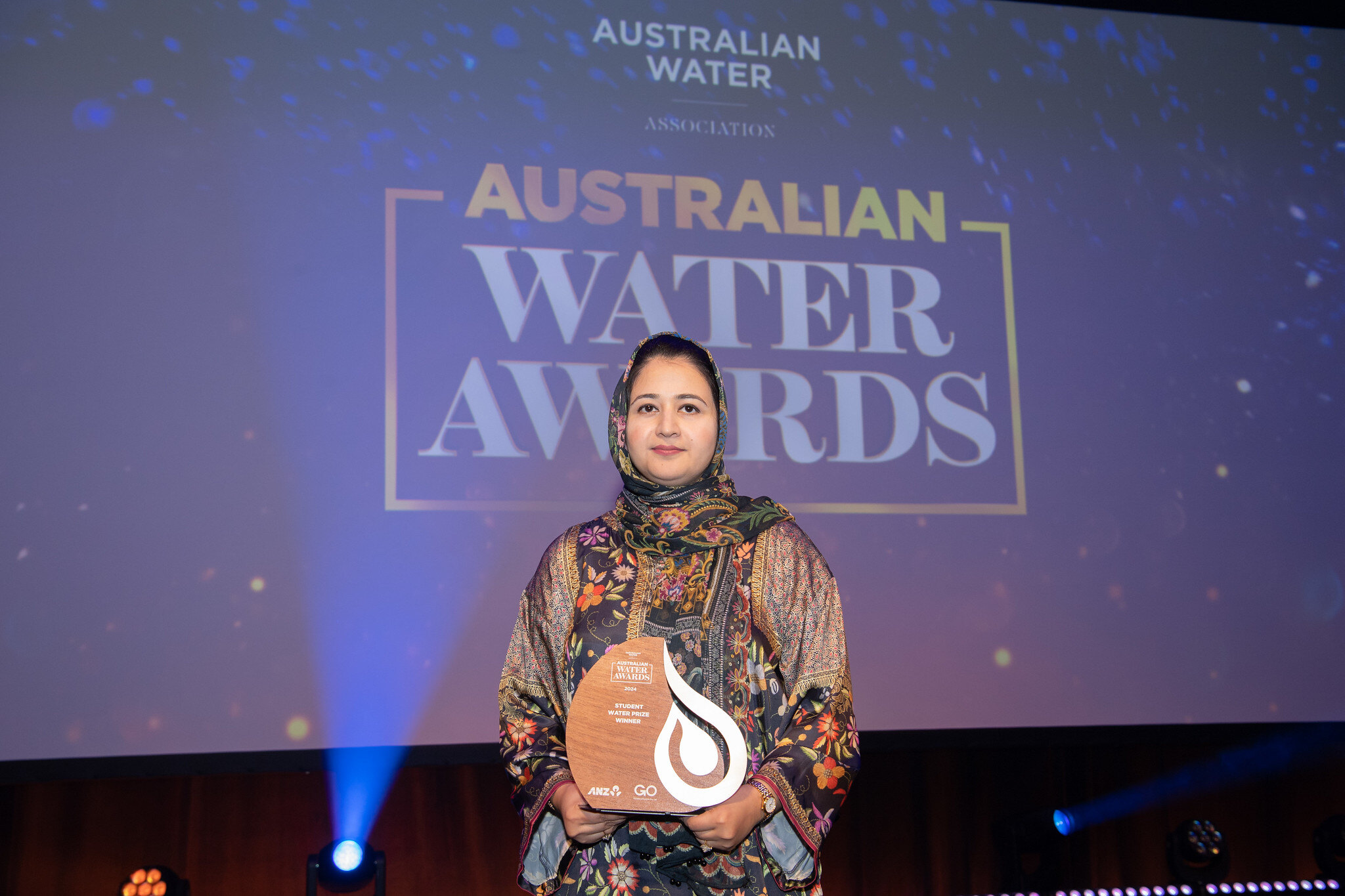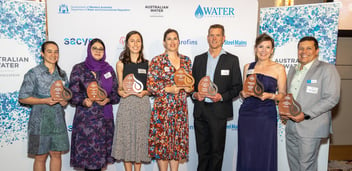2024 Student Water Prize winner applies machine learning to wastewater treatment

“We are all connected by water, and I want to contribute to sustainable, green technology,” said Maira Alvi, reflecting on her motivation for solving wastewater treatment problems with computer science.
Earlier this year, Alvi was awarded the 2024 Student Water Prize at Ozwater’24, a prestigious student award sponsored by Guidera O'Connor that encourages excellence in water-related studies and research.
Awarded annually, the Student Water Prize is open to students and recent graduates of any Australian university or tertiary institute focused on water-related topics. Nominations for the Student Water Prize are now open.
Alvi’s award winning project developed a cost-effective prognostic framework using machine learning to forecast key parameters of wastewater processes ahead of time, enabling enhanced decision support and averting costly failures.
Alvi said winning the award was a complete surprise: “I was the only award nominee for the Student Water Prize that was working within a field that was not directly within water engineering. My background is in computer science”.
“I was incredibly pleased and grateful to be recognised for my work at a national level. I was thrilled and smiling so much that my cheeks hurt,” she said.
Coming from a different background, Alvi said it was quite a challenge to enter the wastewater arena with her PhD project, which involved narrowing down problems and finding appropriate solutions.
“While I had guidance throughout the project, it was a lot of effort to understand the multidisciplinary aspect of wastewater processes,” she said.
“But winning the Student Water Prize made all this hard work well worth it and I was very grateful to be recognised in this way.”
When it comes to her interest in STEM, Alvi said pursuing a career in water is about applying her computer science skills for real-world problem solving that benefits communities.
“When I saw the PhD project advertised at The University of Western Australia, I recognised it as an incredible opportunity to do just that,” she said.
“I want to contribute to sustainability, which is why working in water is something that interests me.
“It’s really all about helping the community and the environment and doing it sustainably – that is what makes this work so important and interesting to me.”
Award winning work
Alvi said wastewater treatment facilities play an important role in preserving ecosystems and safeguarding human health.
The framework she developed helps to improve treatment efficiency and advance knowledge in sustainability and resource optimisation.
“It is very important that we treat all wastewater to provide an offset against environmental harm. In this particular project, we looked at regional facilities,” she said.
“In Australia, there are many remote communities, and it can be hard to frequently visit sites to monitor the facilities. Some parameters need to be monitored in laboratories and we do not always have skilled workers there.
“The overall aim of this project was to consider how to integrate artificial intelligence, deep learning in particular, into these treatment processes to achieve better management and monitoring to help these facilities make informed decisions.”
Alvi’s research looked at how methods could be enhanced to provide environmental offset, as well as achieve economic benefits.
“If a component is very costly, can we replace it with an AI-driven inferential model? We developed a predictive model specifically for ammonium sensors, which can cost around $10,000,” she said
“Ammonium is a critical parameter regulated in discharged water. Our objective was to create a model that could estimate ammonium levels without needing to deploy a physical probe. Instead, we used data from meteorological sources and less expensive sensors to develop a predictive model.
“We also looked at how we might replace the laboratory parameter measurements. We wanted to replace the entire labor-intensive manual process with an AI model, using online sensor readings to approximate those parameters.”
The research project also looked at how to predict certain parameters of interest ahead of time.
“The overall aim was how to do proactive management of these facilities using AI to get benefits in terms of environmental sustainability, as well as fostering resource optimisation in the process,” Alvi said.
Pathways to water
Alvi said her love of computer science began in high school and developed into an interest in helping communities, showcasing how a range of different STEM skills can be applied for a variety of different motivations and purposes.
“In high school, I was fortunate to have an inspiring teacher who explained not only what computers could do but how they work at a fundamental level – I was fascinated by the circuitry and inner workings of computers,” she said.
“My undergraduate degree is in computer system engineering includes electronics, circuits and programming. When I decided to undertake a PhD, I was looking for an area of work where I could apply this knowledge in the service of sustainable development.
“While my PhD focused on enhancing wastewater treatment processes, these applications are really task agnostic and can be applied to a wide range of fields beyond wastewater treatment.”
Now her PhD is complete, Alvi is set to embark on a postdoctoral position at the University of Western Australia.
“I will be leveraging AI to predict the velocity profile of ocean currents, to enhance our understanding of oceanographic dynamics,” she said.
“From a computer science perspective, I really enjoy this area of inquiry because it has many applications. If you have core skills in computer science, they can be used in many different fields, including water and energy and almost all industries.”
For other STEM students interested in a career in water, Alvi recommended exploring internships as a way to apply their training. “I would encourage anyone who has studied STEM subjects to engage in potential career paths in this way,” she said.
“The water industry is very research focused, so it’s also a great place for those students who have a postgraduate research background.
“The wastewater sector is embarking on a wide-scale digital transformation at the moment, which is a really promising place for people looking to apply STEM skills.”
Are you a student that’s contributing to excellence in water research? The 2024 state and territory Student Water Prize applications are open between August and November.


